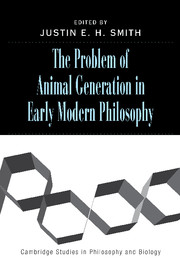Book contents
- Frontmatter
- Contents
- List of Contributors
- Introduction
- I THE DAWNING OF A NEW ERA
- II THE CARTESIAN PROGRAM
- III THE GASSENDIAN ALTERNATIVE
- IV SECOND-WAVE MECHANISM AND THE RETURN OF ANIMAL SOULS, 1650–1700
- 7 Animal Generation and Substance in Sennert and Leibniz
- 8 Spontaneous and Sexual Generation in Conway's Principles
- 9 Malebranche on Animal Generation: Preexistence and the Microscope
- 10 Animal as Category: Bayle's “Rorarius”
- V BETWEEN EPIGENESIS AND PREEXISTENCE: THE DEBATE INTENSIFIES, 1700–1770
- VI KANT AND HIS CONTEMPORARIES ON DEVELOPMENT AND THE PROBLEM OF ORGANIZED MATTER
- VII KANT AND THE BEGINNINGS OF EVOLUTION
- Bibliography
- Index
10 - Animal as Category: Bayle's “Rorarius”
Published online by Cambridge University Press: 06 August 2009
- Frontmatter
- Contents
- List of Contributors
- Introduction
- I THE DAWNING OF A NEW ERA
- II THE CARTESIAN PROGRAM
- III THE GASSENDIAN ALTERNATIVE
- IV SECOND-WAVE MECHANISM AND THE RETURN OF ANIMAL SOULS, 1650–1700
- 7 Animal Generation and Substance in Sennert and Leibniz
- 8 Spontaneous and Sexual Generation in Conway's Principles
- 9 Malebranche on Animal Generation: Preexistence and the Microscope
- 10 Animal as Category: Bayle's “Rorarius”
- V BETWEEN EPIGENESIS AND PREEXISTENCE: THE DEBATE INTENSIFIES, 1700–1770
- VI KANT AND HIS CONTEMPORARIES ON DEVELOPMENT AND THE PROBLEM OF ORGANIZED MATTER
- VII KANT AND THE BEGINNINGS OF EVOLUTION
- Bibliography
- Index
Summary
Sometime before 1539 in Velletri, after dinner, Cardinal Bernard of Cles, a “man of all hours,” had a dog perform for his guests. Not only did it perform the usual tricks, jumping through hoops and so forth, but when its trainer brought out a book of music, the dog, “jumping up on his knee,” began to sing, “now with a high voice, now with a low, sometimes drawn out with continuous breath, sometimes varied and modulated.” Girolamo Rorario, better known by his Latin name “Rorarius,” was quite taken with the animal's uncanny performance. The cardinal, for his part, reflecting on astrology and fate, asked his guest about the power of the stars to govern human acts. Rorarius answered that although the stars may incline us this way or that, still “by reason, which rules most powerfully, man may abstain from those things he knows will lead to unhappiness” (Rorarius 1647, 18). “But why”, the cardinal asked, “have you said that reason rules most powerfully in man? Do you not believe that reason likewise occurs in animals?” Rorarius said that he had long been troubled by that very thought – that indeed “reason oftentimes is found to be better in brutes than in men” (19).
Out of that conversation came the manuscript of a work that was published only a century later.
- Type
- Chapter
- Information
- The Problem of Animal Generation in Early Modern Philosophy , pp. 215 - 232Publisher: Cambridge University PressPrint publication year: 2006
- 2
- Cited by

